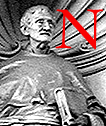[Note: This is an abstract of a presentation to be delivered at the "Hitting the Road! Experiences and writing of travellers in the Victorian and Edwardian Eras" Conference (University of Tours, 2-3 February, 2023). — Taylor Tomko]

early half a century separates the missions to Bokhara, centre of Islamic knowledge and culture in Central Asia, made by the two intrepid travellers and preachers Joseph Wolff (1795-1862) and Henry Lansdell (1841-1919), an important generational and geopolitical gap both in the development of the Victorian era and in the evolution of travel and travel writing. When Joseph Wolff saw Bokhara in 1843, Central Asia was at the peak of Anglo-Russian rivalry in the aftermath of the first Anglo-Afghan War, an extremely dangerous and violent place where his two compatriots, British envoys Charles Stoddard and Arthur Conolly, lost their lives. Lansdell's subsequent travels there in 1882 and 1888 discovered Bokhara subdued under Russian civilising mission and pacified. However, the construction of the railways and military posts once again alarmed the Victorians as a significant strategic move, seemingly to mobilize troops for an attack on India.
This presentation will examine the rhetorical strategies Wolff and Lansdell employed in writing their journeys to Central Asian sensitive border regions under the imperial security constraints of the moment. Their failure of self-censorship in fact erupts in concealed messages to certain sections of Victorian readership able to read between the lines, revealing the undisclosed and unsaid.
Created 16 January 2023